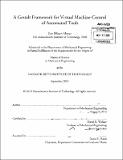| dc.contributor.advisor | David R. Wallace. | en_US |
| dc.contributor.author | Moyer, Ilan Ellison | en_US |
| dc.contributor.other | Massachusetts Institute of Technology. Department of Mechanical Engineering. | en_US |
| dc.date.accessioned | 2014-03-06T15:45:00Z | |
| dc.date.available | 2014-03-06T15:45:00Z | |
| dc.date.copyright | 2013 | en_US |
| dc.date.issued | 2013 | en_US |
| dc.identifier.uri | http://hdl.handle.net/1721.1/85479 | |
| dc.description | Thesis: S.M., Massachusetts Institute of Technology, Department of Mechanical Engineering, 2013. | en_US |
| dc.description | Cataloged from PDF version of thesis. | en_US |
| dc.description | Includes bibliographical references (pages 139-141). | en_US |
| dc.description.abstract | Computer aided design has become affordable and ubiquitous, in part as a result of the development of open source design software and web-based 3D modeling tools. Consequently, a broad spectrum of individuals are expressing demand for access to digital fabrication tools that are capable of automatically rendering their computer-based designs into physical objects. In response, manufacturers have begun to produce low-cost versions of a limited set of automated, personal-use fabrication tools, including 3D printers and desktop milling machines. Simultaneously, groups of individuals and organizations are establishing community workshops where resources can be pooled to acquire industrial-grade machinery. Both of these approaches have been successful at increasing the penetration of digital fabrication capabilities into the general population. However, there are many industrial tools which currently have no consumer-centric equivalent, and for which demand is insufficient to warrant acquisition by a community workshop. Additionally, as digital design continues to find new applications among a larger and more diverse audience, new needs will likely arise for yet non-existent automated fabrication tools. Gestalt is an accessible and flexible control framework which aims to augment the ability of individuals to create new automated tools, and to thus self-extend their abilities to create objects which would be too tedious or impossible to create by hand. This work will enable individuals to rapidly construct controllers and rich user interfaces for automated personal fabrication tools. The approach taken is that of a software-based virtual machine controlling a physical machine. This allows for increased modularity in controller implementation, and tighter integration of the tool with user applications than is possible with traditional controller architectures. The foundation of the proposed system provides a means for building APIs to communicate with modular hardware components, and a method of combining the functionality of these components at the virtual machine level (rather than in hardware) to yield higher-level functionality. The Python library developed in this work enables the rapid construction of cross-platform virtual machines that are capable of representing and controlling a wide variety of tools over commonly available interfaces such as USB. Additionally, a matching C library assists in developing microcontroller firmware for building custom modular hardware elements that can communicate with the virtual machine. A spectrum of unique fabrication tools controlled using the Gestalt framework are presented as case studies which elucidate both the successes and limitations of our approach. | en_US |
| dc.description.statementofresponsibility | by Ilan Ellison Moyer. | en_US |
| dc.format.extent | 153 pages | en_US |
| dc.language.iso | eng | en_US |
| dc.publisher | Massachusetts Institute of Technology | en_US |
| dc.rights | M.I.T. theses are protected by copyright. They may be viewed from this source for any purpose, but reproduction or distribution in any format is prohibited without written permission. See provided URL for inquiries about permission. | en_US |
| dc.rights.uri | http://dspace.mit.edu/handle/1721.1/7582 | en_US |
| dc.subject | Mechanical Engineering. | en_US |
| dc.title | A gestalt framework for virtual machine control of automated tools | en_US |
| dc.type | Thesis | en_US |
| dc.description.degree | S.M. | en_US |
| dc.contributor.department | Massachusetts Institute of Technology. Department of Mechanical Engineering | |
| dc.identifier.oclc | 870971492 | en_US |
